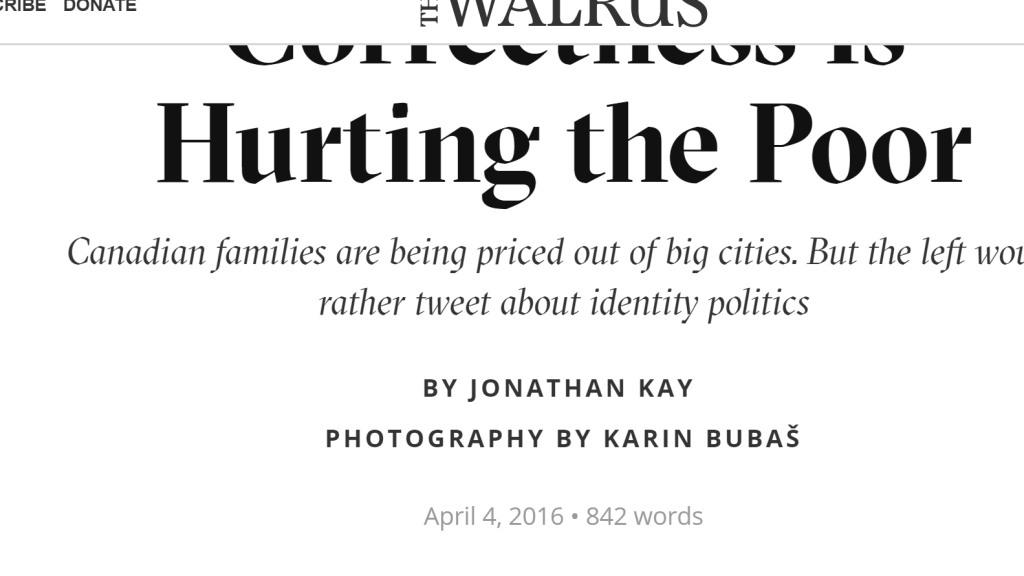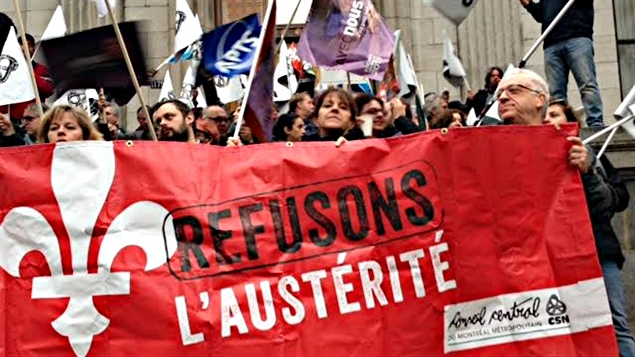I’ve been very busy with writing and other things the past couple months, which has meant the podcast has unfortunately taken a back seat. There haven’t been new episodes for a couple months. Apologies to regular listeners, but it will rise from its slumber soon. Look out for it!
Author: Michal Rozworski
One of the clearest memories I have from my only trip to Norway is the repeated failures at hitching a ride. What appeared to be an unbroken string of brand new Audi’s and BMW’s whizzed by my friend and I, dirty and sweaty after a few days hiking and camping in the mountains. “Where am I that the comforts of our rich assholes are the rights of common citizens?”, I remember thinking.
You’ve probably seen at least one article saying that Alberta should be more like Norway. I don’t want to rehash that debate. But I think we’ve gone about it the wrong way and seeing why can tell us a lot about today’s sparring over the Leap Manifesto.
Comparing Alberta unfavourably to Norway for squandering its oil wealth has been a familiar trope of media and progressive organizations, especially since the oil price crash (here’s just the CBC, Toronto Star and Globe and Mail). The comparison has become so ubiquitous that it has also spawned a cottage industry of counter–arguments from the right too. In short, Norway has been putting away the money it gets from oil in a sovereign wealth fund since 1990. The fund is now the world’s largest and worth over $1 trillion. Alberta’s fund, although older and actually the inspiration for Norway’s, is a paltry $15 billion. (Norway and Alberta have similar populations.)
The funny thing, however, is that Norway’s gigantic fund doesn’t pay for much of what the government does. Taxes do that. Take a look at the numbers. Public revenues in Norway at all levels of government are equal to over half of GDP (nearly 55% in 2014). Meanwhile, federal, provincial and local government revenues in Alberta make up somewhere around 30% of provincial GDP. That’s a massive difference. Alberta tax rates are lower: on individuals, on corporations and on consumption. In addition, the Norwegian government not only owns a majority share in its largest oil company, Statoil, but also taxes oil profits at a much higher rate. A special tax on “excess profits” takes the top marginal corporate rate on oil corporations to 78%.
My interview with JW Mason on how wonk critics of Sanders’ economic ideas reinforce low expectations was transcribed for Jacobin under the great title, “Beltway Bullshit.”
Michal Rozworski: There’s been a big debate recently around Bernie Sanders’s economic ideas. It was precipitated by Gerald Friedman’s claim that Sanders’s plans would lead to 5 percent nominal economic growth over a certain period, substantial working- and middle-class income growth, and massive job creation. Pretty quickly, liberal economists like Paul Krugman or former chairs of the Council of Economic Advisors attacked this paper as unrealistic. What is your argument here?
JW Mason: So far, until now I think in the campaign the core questions of macroeconomic policy — whether we can or should want to see a higher level of GDP and employment or faster growth going forward — haven’t really been central on the Democratic side and Jerry’s paper really raised those issues.
Now I don’t think we want to get caught up in the specific strengths or weaknesses of that paper or the plausibility of particular numbers. I think that there are some problems with the paper. If you were to do the same exercise more carefully you would probably come up with lower numbers.
I think it would be foolish to defend the specific estimates that Friedman put out there, but I also don’t think that there is any real need to do so because the fundamental issue, as you say, is not this number or that number. Obviously things evolve under the pressure of events.
Economic forecasting is a very imprecise science in the best case. The question is whether there is good reason to think there is space for a substantially more expansionary policy. Is there good reason to think that a big expansion of public spending could substantially boost GDP and employment?
And I think that there the answers are clearly yes. This paper and the debate that it has sparked has actually been very productive in getting people to engage that question and getting a number of more mainstream Democratic-associated economists to agree that there is actually space for substantial additional expansionary policy.
What does this debate say about the diminished expectations about the economy that we have? Is this what you’re saying that it’s fundamentally about?
That is what it’s about. The position on the other side, the CEA chairs and various other people who’ve been the most vocal critics of these estimates, has been implicitly or explicitly: “This is as good as we can do.”
Jonathan Kay advises the left
Jonathan Kay knows what’s hurting the poor. Is it absurdly low welfare rates and social supports? Perhaps it is lack of access to affordable housing? Poverty wages? Food insecurity? Over-policing? No, says Kay, the honest broker of politics, the inconvenient truth-speaker, it’s the left’s political correctness that’s really keeping the poor down.
Kay supports this claim with a jumble of obvious facts, unexamined assumptions and misrepresentations held together like the remnants of the fraying neoliberal consensus. In his most recent Walrus editorial, Kay jumps from (1) houses in Vancouver cost too much (true) to (2) it’s all the fault of the Chinese (nope) to (3) the left doesn’t care about class or the poor (wtf), all in the span of under 900 words! Here’s the punchline, complete with the obligatory reference to “things I’ve seen on social media”:
The left now has a golden opportunity to push for bold policies that would go to the heart of income inequality in our class-based society: guaranteed income, universal access to care for those suffering from mental illness, and, yes, tax and regulatory policies that discourage hot money from overinflating local real-estate markets. But from what I’ve read on social media and in Walrus editorial submissions, many activists and pundits seem far more comfortable striking positions on highly compartmentalized identity-politics issues that can be reduced to succinct, tweet-able messages.
For someone who has so much sage advice for the left on class politics, Kay is utterly oblivious to how class operates. Kay castigates Vancouver mayor Gregor Robertson for not speaking out against the real estate bubble ballooning under his watch and blames it on steadfast anti-racism. Is Robertson a bleeding heart liberal hopelessly in the clutches of radical dogmas or is it rather that he is the leader of a party that received hundreds of thousands of dollars in campaign contributions from real estate developers in the city?
There’s no point in citing the innumerable left articles, speeches, rallies, occupations, forums, talks and leaflets on the topics of “socio-economic stratification, poverty, and income inequality” that Kay claims are missing. What better proof that the left has managed to get all of these issues onto the agenda than the fact that clueless elite scribes like Kay are forced to treat them seriously?
Then again, here’s just one example, from this very blog back in 2014 on the same topic of Vancouver’s unaffordable housing:
The growth of inequality, attacks on pensions, increases in lifespans, aggressive tax cuts – all of these factors have moved wealthier Canadian households to look for new investment opportunities. Investment in real estate has been helped by low mortgage rates, a supply of new housing skewed towards small, high-end condominiums as well as existing equity available to those who lucked out and grew rich on the initial housing boom that started in Vancouver in the 1980s.
As absurd as it is to say it explicitly, it’s not a hegemonic anti-racism that’s driving millennials and the poor out of cities like Vancouver. It is the combination of record low interest rates and money pumping pushing up asset prices all over the world. Art auctions are breaking records and condos are selling like hot cakes because the rich have won—they no longer have to make productive investments that will boost the wages of regular folks alongside boosting their wealth. It is also government at all levels completely abandoning the project of house-building. The Liberals in the 1990s announced that the Canadian government was “not in the business of housing” and turned to driving private mortgage finance instead.
It is a global glut of too much money chasing too little tangible wealth. Just by virtue of proximity, money from mainland China plays some role in the housing bubbles in Hong Kong, Sydney or Vancouver. But is money from mainland China pricing people out of New York City? out of London? out of Amsterdam? Everywhere it is the wealthy who are pushing out the poor. Developer-funded crocodile tears, not anti-racism, are stopping meaningful reform that would include progressively taxing wealth, wherever its owners are domiciled.
Kay mentions that the average individual income in Vancouver is $43,000. The average for recent immigrants is about half that. The overall median is closer to $30,000. Here’s an opportunity for class and anti-racist politics; the kind already pushing for a higher minimum wage and pushing back against developers. It’s one where the poor, the working class and the racialized have autonomy over solutions rather than being told inequality is a big problem elites should solve. Maybe Kay’s protests and lamentations about Uberization or union weakness would be more believable if they didn’t come from an avid fan of Uber who “won’t go back to cabs” (and whose big solution is to cash out cabbies with a one-time payment) or someone who has wasted hundreds of column inches attacking unions of all stripes.
The truly blind to the class politics screwing workers and the poor are those like Jonathan Kay whose complaints take political cues from service to elites.
Today’s federal government budget is a litmus test for the new Liberal government. They campaigned on promises of “real change” from the last regime, including a willingness to increase social spending even if it meant running deficit budgets. And, in keeping with this pledge, spending is up, and the deficit is forecast at $29.4 billion.
This is fine in the short term, but it isn’t just about how much spending will be created. The really crucial thing is what kind of spending. Since the 1990s, the Liberals across the country have been masters at implementing a slow-grinding austerity that has cut programs, given away our public services to private interests, and reduced taxes, largely for business and the rich.
More than anything else, this budget reads like new technocratic consensus. Like 1990s austerity, Canada’s Liberals are once again at the forefront of global elite policy. In an era of slowing growth and productivity, with monetary policy by central banks all but exhausted, even the OECD and IMF have called for higher deficits. The Liberals are forging the path that the global elite will try to travel to get global capitalism working again — especially for the elite. As Greg Albo remarked, with this budget the Liberals have rolled back Harper but left Chretien and Martin untouched.
The question of deficits dominated a lot of the economic debate in Canada during the 2015 federal election and even today. Jeremy Corbyn’s Labour Party introduced a new fiscal policy last week that, on surface, appears to mirror the NDP’s anti-deficit stance from the 2015 campaign. Looking closer, however, Labour’s policy diverges quite substantially and points to more honest and transformative economic policy for the left.
Podcast: Play in new window | Download
Subscribe: Apple Podcasts | Android | Email | Google Podcasts | RSS | More
This week, I interview two guests on fairly different topics linked by the fact that they both give very effective debunkings of some mainstream economic thinking. First, I speak with JW Mason, economics professor at John Jay College in New York City, about the debate that has erupted around Bernie Sanders’ economic program. JW argues convincingly that the criticism of Sanders from mainstream liberal economists is about managing and keeping a lid on regular people’s expectations for the economy. The critics are effectively saying “this is the best we can do” even when millions are condemnded to poverty and shitty jobs. Be sure to check out his posts (1, 2 and 3), which are among the best on this debate.
Second, I speak with Nathan Tankus, a writer also based in New York City, on why housing is so unaffordable in large cities even amidst massive condo building booms. Nathan goes through the history of his Chelsea neighbourhood in NYC and its long process of gentrification as a way of drawing some conclusions about why the housing market is so screwed up. It turns out this market doesn’t work like the model described in Economics 101 textbooks. For further reading on the topic, Nathan suggests Bob Fitch (especially The Assassination of New York), Doug Henwood and Michael Hudson.
Will Sanders’ rise be felt in Canada?
Co-written with Derrick O’Keefe and originally published at Ricochet.
Even if he’s really only offering a pragmatic form of social democracy, Sanders has created a political space in the mainstream left that’s sorely missing in Canada. His insurgent campaign for the Democratic Party nomination has put inequality and systemic injustice front and centre in the United States.
Policy proposals aside, merely having the word “socialism” back on the agenda in the United States signals a massive shift. Compare Sanders’ unabashed use of the term to recent NDP history.
Canada’s traditional social democratic party has spent recent years downplaying and scrubbing away the last vestiges of socialism from its public presentation. Under pressure from party leaders and bureaucrats, the NDP removed all but one reference to it from its constitution in 2013. The s-word is now only mentioned in passing in the party preamble.
It’s useful to take a broader view than just the recent botched campaign and the party itself. For years, the NDP’s leadership and top advisors have taken their cues from their counterparts in control of the Democratic Party — an electoral machine that has been effectively captured by a small coterie of the rich and powerful.
Podcast: Play in new window | Download
Subscribe: Apple Podcasts | Android | Email | Google Podcasts | RSS | More
I have two Canadian updates this week. The first is from Nora Loreto on what’s happening in Quebec after the fall’s anti-austerity strikes. Nora is a Quebec City-based journalist and labour activist. She gives an account not only of what happened during the strikes in Quebec, but also what to expect in their wake (see the previous podcast, from just before this strike wave, here). Second, Armine Yalnizyan, economist at the Canadian Centre for Policy Alternatives, is back with an analysis of Canada’s economy after the oil price crash.
We have lived to see the day of a condo boom in Hamilton, Ontario. We have made housing into an object of speculation that sucks in money from here and everywhere, foreign and domestic. For those still wondering, the problem isn’t at heart “foreign”, it’s “money.”
It’s that housing, a basic human right, has been left completely to the market. Ironically, the housing market might not follow the simple ECON 101 supply and demand story; that’s what the first part below is about. The second is a stab at a utopian response that pushes the boundaries of today’s acceptable solutions.
Beyond supply and demand
I’m increasingly sympathetic to arguments that the market for housing isn’t just about supply and demand, with the former not meeting the latter. Most markets are about more than that (as so many challenges to the reductive economic orthodoxy have claimed), but housing seems to be especially prone to a richer analysis.
This is because housing both plays many roles in our social and economic life, and because of its recent history. Housing has been particularly important to the economic transformations of the second half of the 20th century.




